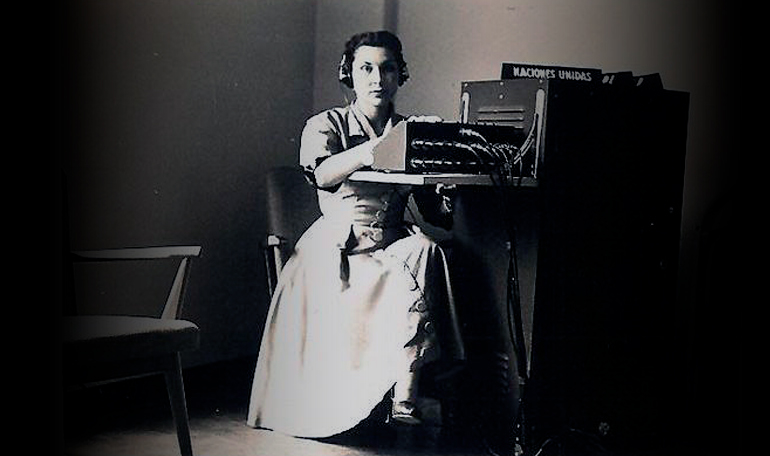- Our founder
- To talk about CM Idiomas, we have to talk about its founder, Italia Morayta, a key figure and promoter of interpretation and translation in Mexico.
- It all began in 1947, during the Second General Conference of UNESCO, held in the capital of the country, which Morayta attended as a journalist for El Universal. Circumstances obliged her to stand in as an interpreter in one of the conference rooms and, subsequently, to interpret in the Spanish booth in the plenary hall.
- As a result of these interventions, she received an invitation from the US Department of State to formally train as a conference interpreter in Washington, DC (USA). In 1948, she returned to Mexico and founded the first translation and interpretation agency in the region.
- Even though Italia Morayta belongs to the first generation of simultaneous interpreters in the world, the importance of her work lies in the fact that, in addition to securing decent working conditions, she decisively promoted the professionalization of this activity in Mexico at a time when there were no other professional associations or academic institutions to train interpreters and translators.
- As official interpreter for several presidents of Mexico and at countless international meetings at the highest level, Italia Morayta forged an outstanding career that paved the way for the generations that followed.
- Visit the section Our foundaion to learn more about the Italia Morayta Foundation and the social engagement that CM Idiomas is involved in, following in her footsteps.

Upon finishing her training in Washington, she was selected to provide her interpreting skills at the Ninth International American Conference in Bogotá. The political instability in the Colombian capital reinforced her professionalism. In 1948, she returned to Mexico and participated in the International Conference on High Frequency Broadcasting. The event lasted almost a year, during which time she married Dr. Miguel Morayta and warned that in Mexico there was a lack, in addition to competent interpreters, of specialized personnel to perform all the functions required by the secretariat of any congress that might be organized in the country (interpretation, translation, reporting, minutes, administration, shorthand typing). With the support of a network of friends, both foreign and local, she set up the Association of Technical Personnel for International Conferences. In this way, she created both the professional supply and invented the demand. There is no work without a client.
Graciela de Garay, historian
…More important are the achievements that Italia acknowledged with the support of the Association [of Technical Personnel for International Conferences that she founded]: ensuring that Mexico had a first-class and highly competitive interpreter secretariat service; and training personnel on the job who could cover the different areas of the secretariat of an international congress. Furthermore, in the field of interpretation, the Association fulfilled in advance the task of creating specialized study centers in Mexico. The first interpretation schools at a technical level were opened in the 1960s and it was not until the 1980s that efforts came to fruition for interpretation to be a subject available at the undergraduate level. Italia was also proud to have formalized the establishment in Mexico of a code of ethics for the profession, decent working conditions, quality standards, as well as a clear description of the obligations and responsibilities governing the professional activity of interpreters.